Leaders in Teaching supports and mobilizes teachers and school leaders, who are at the front lines of education and prepare young people for meaningful employment. Aligned with Rwanda Vision 2020 and developed in consultation with Ministry of Education and the Rwanda Education Board, Leaders in Teaching was launched in 2018 and is implemented through our partners: VVOB-education for development; UNICEF; Inspire Educate and Empower (IEE) Rwanda; Carnegie Mellon University Africa; African Institute for Mathematical Sciences (AIMS) and the University of Rwanda College of Education.
Teachers are the second most important influence on a young person’s life, after their parents. They are the backbone of vibrant and dynamic economies. In this month’s newsletter, just in time for World Teachers’ Day, we invite you to learn more about how Leaders in Teaching is equipping teachers and school leaders with the tools, skills, and supports they need to be more effective in educating the next generation of entrepreneurs, agripreneurs, developers, business leaders, scientists, and leaders.
I always enter in a classroom having in mind that I am shaping my own future, my family’s tomorrow — my legacy and my nation’s foundation.
On October 19, VVOB is hosting a return day workshop with its partners to celebrate the achievements of the first cohort of the Continuous Professional Development (CPD) training program. Organized at both sector and district levels, the goal of the workshop is to capture the most significant change stories. Beginning at the school level, school leaders will send their stories to the Sector Education Officer (SEO), who will submit one story from each school to the District Director of Education. In addition, the SEO will write an individual story and submit it to the DDE. The DDE, in turn, will select a maximum of six significant change stories at the district level within two weeks. The selected stories will be presented during the return day workshop.
UNICEF is working with the Ministry of Education (MINEDUC), Rwanda Education Board (REB), and Carnegie Mellon University Africa, teacher training colleges and others to strengthen and improve how data is used for planning and decision-making.
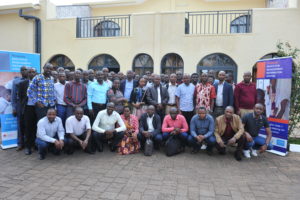
Attendees at UNICEF consultative workshop
UNICEF, in partnership with the Ministry of Education, held a district-level consultative workshop to assess education data needs and utilization as part of the development of an integrated Education Management Information System (EMIS) architecture. The workshop brought representatives from districts and sectors and identified:
In collaboration with the Mastercard Foundation, IEE is working with Africa24 to tell the story of the Leaders In Teaching Teaching Assistantships Program (TAP). The video features different TAP stakeholders talking about the significance of the pilot program.
On September 21, AIMS Teacher Training Program held a graduation for 41 mathematics and science teacher trainers from across 14 districts in Rwanda. They successfully completed a program accredited by the International Computer Driving Licence (ICDL).
Teachers are the roots, the basis, the foundation of any other career. I’m teaching with the hope of helping our country on a large scale. My passion is sharing my knowledge to the next generation.
From August 7 – 11, 2019, UR-CE hosted a workshop on how to strengthen the Postgraduate Certificate of Learning in Teaching in High Education program. The program focuses on integrating the competence-based approach of learning into assessment. It will be strengthened to ensure teachers and facilitators, in both public and private sector, are equipped with the skills, attitudes, and resources to be effective in their role.
On September 4, a workshop was held to review the modules that constitute the postgraduate certificate in Learning and Teaching in Higher Education. The course is accredited by the Higher Education Council and provides a nationally recognized qualification for teaching and academic practice in higher education. The course, which is delivered using an online blended model, is for participants interested in gaining a clear understanding of the core activities and pedagogical theory that underpins a professional role in teaching and supporting learning.
Teaching is my vocation. Back when I was in primary school, my teachers inspired me. I could see their behaviour and attitudes and wanted to be just like them.
Inclusive and equitable education provides all learners with the capabilities to become economically productive, develop sustainable livelihoods, contribute to peaceful and democratic societies, and enhance individual well-being. Professional Learning Communities (PLCs) matter for quality education as they play an important role in the professional development and motivation of teachers and school leaders.
PLC sessions are conducted on a regular basis and are a platform at the sector level where school leaders meet face-to-face with the objective of learning with and from each other through solving challenges and sharing good practices. During PLC sessions, members focus on finding solutions to challenges regarding the quality of teaching and learning in their schools.
To facilitate knowledge-sharing among a wide range of education stakeholders including parents, teachers, and school leaders, a peer learning magazine, ‘Urunana rw’abarezi’ is produced twice a year with VVOB support.
The eighth edition of the magazine focuses on “the contribution of information and communication technology to improving the quality of basic education”.
The stories shared in this edition depict good practices, lessons learnt and tips on how ICT improves teaching and learning as well as school administration and management. It also looks at how ICT enhances teacher professional development and contributes to improving learning outcomes in basic education.
Since 2017, Sister Françoise Umwali has been a school leader at G.S Saint Dominic Gihara, a twelve years basic education school located in Kamonyi district. She shares how the Leaders in Teaching Continuous Professional Development (CPD) diploma course in Effective School Leadership that she completed is helping her to improve her school.
“The training waked me up and reminded me that improving learning outcomes is and should always be the first priority for every school leader,” she explains.
The training was an opportunity to meet other school leaders and learn from their broader perspective. According to Sister Umwali, “we became more aware about issues we face as school leaders and discussed different strategies to address them. I gained a lot of insights about the five standards of effective school leadership: working with parents and the wider community, leading learning, leading teaching, and managing the school as an organization. As a result, I improved collaboration with parents, hence their participation and support in finding solutions increased.”
The training also reminded Sister Umwali to improve collaboration with and support teachers. “They (teachers) had to follow instructions as they are. As I attended the training, I started organizing regular meetings with them to discuss how to improve our school. I asked them to be open and raise any issues they face, and this has improved our communication”.
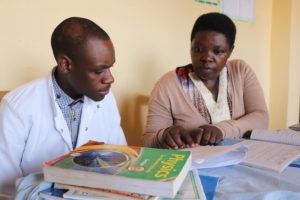
Sister Umwali (left) provides feedback working with a teacher at her school.
Sister Umwali admits that she had no consistent plan to support her teachers to improving teaching and learning. She explains that “before the training, I would pay surprise visits to one or two teachers in classrooms every week, but these were not effective as many teachers did not feel comfortable with this technique. Today I elaborate a plan and share it with teachers. I manage to visit at least two teachers every day and teachers are happy with this.”
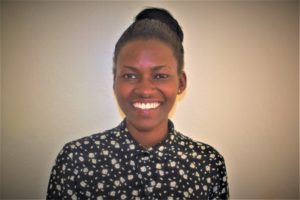
Blandine Ineza
In her school life, Blandine never thought of trying to do anything like teaching, even teaching her siblings or friends at home or school. She was not confident enough to stand in front of her friends and share her ideas when it came to group presentations in her school. So many times, she would pretend not to have understood the topic her teacher had introduced and taught, to avoid standing in front of her class.
As part of their training UR-CE student teachers recently completed practicums where they had an opportunity to put theory into practice. Two students talk about their experiences below:
James Murenzi is a final year student at University of Rwanda, College of Education majoring in Humanities (History). He dreamt of becoming a teacher because teachers are major contributors to any country’s development and every important person was influenced by a teacher.
He believes that the practicum session is important because it’s a chance for students to put theories in practice. He believes that in addition to the usual internship program, practicum is another opportunity for student teachers to become familiar with secondary school life and experiences.
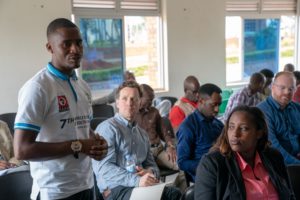
James Murenzi at the Leaders in Teaching learning summit.
When asked what he thinks of World Teachers’ Day, he replied, “I see the World Teachers’ Day as a special day because it indicates how the world values the teacher, it is a recognition sign.”
***
Ishimwe Bonna is a final year student at the University of Rwanda College of Education.
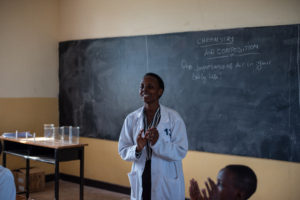
Bonna Ishimwe in the classroom
She said, “During my secondary school, I never had a dream of becoming a teacher, I was aiming at studying medicine and become a doctor, but after doing a national exam, I was admitted in Education at UR CE, and now changed my mind, since I missed that chance of becoming a doctor, its perhaps God’s plan so that I will and produce more doctors”.
What some students from FAWE girls school had to say about the pre-service teachers from UR-CE in their classroom:
“We do appreciate student teachers, they are caring, excited to deliver their subjects, humble in one way or another. We do appreciate their contributions”.
Some of my former students once invited me to a party. To my surprise the party was for me! ‘We’re so grateful to you for being a great teacher to us. We’re who we’re because of you,’ one student said to me. I was so touched, choosing the teaching career was a right choice.
23-25 October – VVOB and Rwanda Education Board will participate in the E-learning Africa conference and present: “Empowering Educators through Continuous Professional Development: Blending the Continuous Professional Development (CPD) of School Leaders in Rwanda”. The conference takes place in Ivory Coast.
At the end of October UNICEF and MINEDUC will hold a high-level consultative workshop at the national level around the development of an integrated EMIS. The expected results of this workshop are to capture education data needs, and capacity development constraints and approaches to analyze and use education statistics effectively for policy design.
7- 11 October – UNICEF in collaboration with the Rwanda Education Board, is organizing four days of training on the utilization of the Teacher Management Information System (TMIS) for 20 Teacher Development and Management Department (TDM) for staff in charge of teacher recruitment, placement, transfer, training and evaluation.
During the upcoming months, UR-CE will be providing professional development opportunities for faculty and staff that will strengthen the quality of pre-service training. These include:
10 – 23 October – IT equipment arrives for 14 district Smart Classroom. They will be furnished with laptops, interactive projectors, printers and an uninterruptible power supply (UPS).
7 – 12 October – AIMS TTP in partnership with Rwanda Education Board will facilitate industry visits for 1,136 secondary school students and 136 teachers from 11 districts. The visits will give teachers and students an opportunity to see first-hand how science and math concepts intersect with real life. Experiential learning of this nature is an important feature of the Rwandan Competency Based Curriculum (CBC).
18 – 24 November – In partnership with WAAW Foundation and UR-CE, AIMS will host a workshop using STEM in a backpack for a select group of UR-CE faculty members, pre-service teachers, and teachers from the two pilot secondary schools where the backpacks will be used. The backpacks include components like Arduino starter kits, snap circuits and 3D printers.
2 – 10 November – In collaboration with partners and teachers. AIMS will host a number of activities to celebrate World Science Day for Peace and Development.